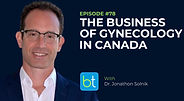BackTable / OBGYN / Podcast / Episode #52
Navigating Adenomyosis: From Misconceptions to Innovative Solutions
with Dr. Keith Isaacson
This episode of BackTable OBGYN features an extensive discussion with Dr. Keith Isaacson, a specialist in Reproductive Endocrinology and Infertility, regarding the complexities of diagnosing and treating adenomyosis, emphasizing surgery, medical treatments, and research in the field.
Be part of the conversation. Put your sponsored messaging on this episode. Learn how.

BackTable, LLC (Producer). (2024, April 30). Ep. 52 – Navigating Adenomyosis: From Misconceptions to Innovative Solutions [Audio podcast]. Retrieved from https://www.backtable.com
Stay Up To Date
Follow:
Subscribe:
Sign Up:
Podcast Contributors
Dr. Keith Isaacson
Dr. Keith Isaacson is a minimally invasive gynecologic surgeon with Mass General Brigham Newton-Wellesley Hospital in Newton, Massachussetts.
Dr. Amy Park
Dr. Amy Park is the Section Head of Female Pelvic Medicine & Reconstructive Surgery at the Cleveland Clinic, and a co-host of the BackTable OBGYN Podcast.
Dr. Mark Hoffman
Dr. Mark Hoffman is a minimally invasive gynecologic surgeon at the University of Kentucky.
Synopsis
Dr. Isaacson describes the pivots in the field’s understanding of adenomyosis and endometriosis, including the impact of these conditions on fertility and potential treatment pathways. Adenomyosis has been redefined in the past five years as a disease that affects women of all reproductive ages and causes dysmenorrhea, heavy menstrual bleeding, and infertility. Because the disease is found in the myometrium of the uterus, it has historically been difficult to diagnose unless through pathology following hysterectomy; however, imaging has since improved and there are now criteria seen on ultrasound that are consistent with adenomyosis.
Dr. Isaacson then discusses the differences and misconceptions about adenomyosis compared to endometriosis. Additionally, the episode touches on the evolution of treatment strategies over the years, including medical therapy versus surgery. Furthermore, Dr. Isaacson highlights the crucial role of research in uncovering disease pathophysiology and new therapeutic approaches.
Timestamps
00:00 - Introduction
04:06 - Definitions, Symptoms, and Insights
11:33 - Exploring Treatment Options for Adenomyosis and Infertility
21:30 - The Intersection of Endometriosis and Adenomyosis
30:09 - Imaging, Surgery, and Pathology
36:31 - The Future of Research and Patient-Centric Care
Resources
Moawad G, Fruscalzo A, Youssef Y, Kheil M, Tawil T, Nehme J, Pirtea P, Guani B, Afaneh H, Ayoubi JM, Feki A. Adenomyosis: An Updated Review on Diagnosis and Classification. J Clin Med. 2023 Jul 21;12(14):4828. doi: 10.3390/jcm12144828. PMID: 37510943; PMCID: PMC10381628.
Transcript Preview
[Dr. Keith Isaacson]
The most interesting part of this is that 80% of women who have adenometriosis present with painful periods, heavy cramping. We always thought that, okay, that's related to stage one or stage two endometriosis. You go in, you remove a low lesion on the ovary or the surface of the peritoneum, that that's going to improve. It turns out we just missed the adenomyosis in those patients. My personal bias is that adenomyosis is probably much more common and certainly presents with more common symptoms than endometriosis does. We had to have to rethink everything we thought we knew about endometriosis, as well as adenomyosis. That's where we are today.
Disclaimer: The Materials available on BackTable.com are for informational and educational purposes only and are not a substitute for the professional judgment of a healthcare professional in diagnosing and treating patients. The opinions expressed by participants of the BackTable Podcast belong solely to the participants, and do not necessarily reflect the views of BackTable.













